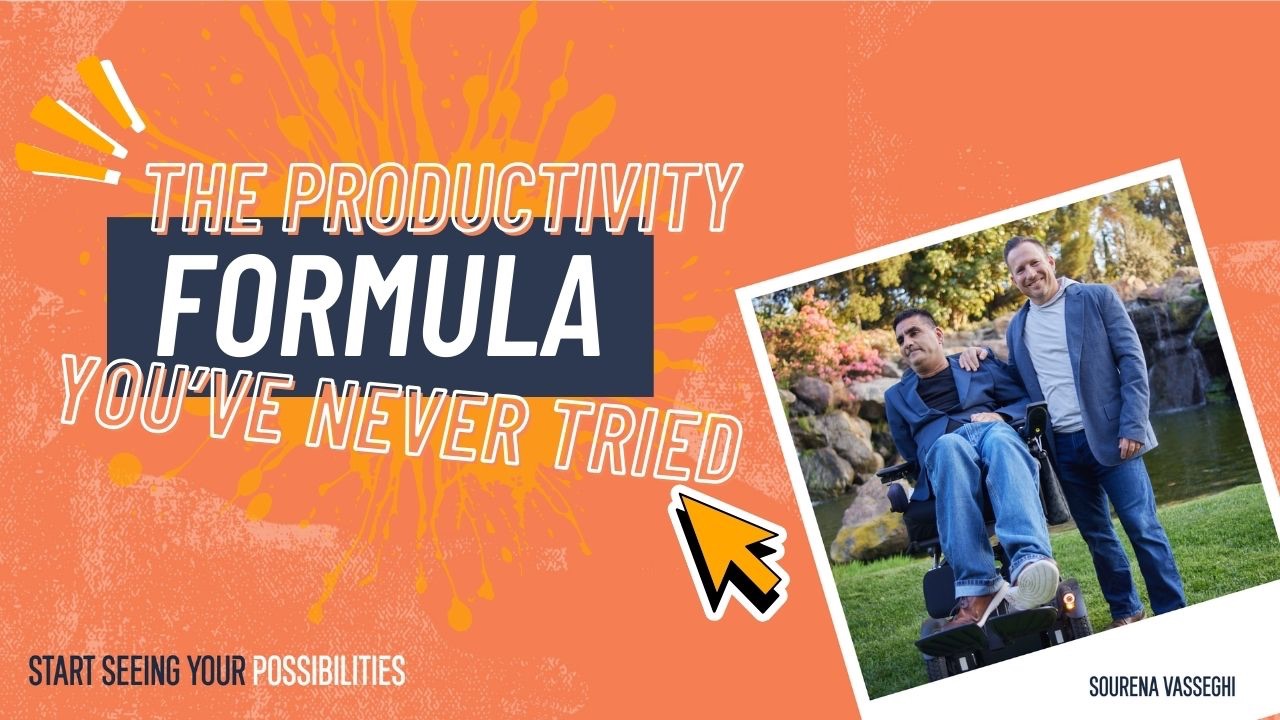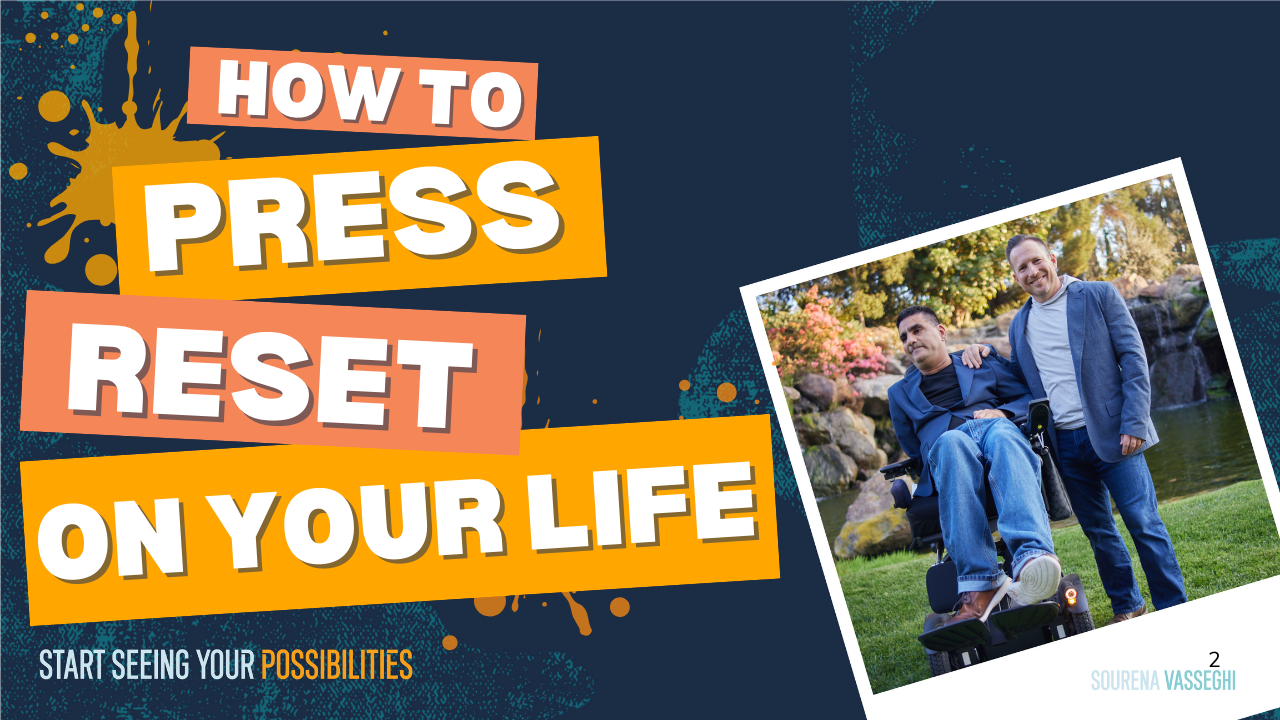Redefine Strength

A big part of success is developing our strengths and mindset required for whatever we want to accomplish, whether that’s growing a company, getting ahead in our industry or even raising children. Part of our narrative is what strength really means.
If I ask you to imagine a strong person, you might envision a tough, rugged, person. Unfortunately, different goals take different strengths. Our narrative about what strength is can often get in the way of developing the true strengths that are needed in order to accomplish our goals.
My disability forced me to redefine my definition of what it means to be strong. My mindset was strongly influenced by my parents who are two of the strongest people I know. Part of my father’s success was due to sheer hustle. When my dad was younger, we joked that my dad would never walk. Everything was a slow run.
The way my parents achieved success was not an option for me. I had to create my own definition of success. If I didn't, then I would limit myself because I wasn’t willing to opt out of my preconceived notions.
At the societal level, we need to redefine what strengths are and how we look at the world. For example, in the United States, we love our combustible engines. However, to move forward, we might have to rethink our relationships to these American staples.
Many of our notions of strengths are societal, political, religious, or cultural
Since every goal or every situation takes a slightly different narrative or different mindset, we must challenge the way we think about what it means to be strong.
There are situations where false sense of strength can hurt your chances for success. A prime example of this is asking for help. Many people are taught that asking for help is a sign of weakness, but, the truth is, every successful person has an army of amazing people behind them, and very few great feats are accomplished without those people. Don’t let your narrative that says, “I have to do it alone” or “seeing a psychologist is a sign of weakness” stop you from moving forward.
Another example of this is admitting you were wrong. Oftentimes, admitting you were wrong is a great sign of strength. Many people spend untold amounts of time, money, energy, or bandwidth proving a falsehood. A sign of true strength is admitting your mistakes, swallowing your pride, and checking your ego.
Another problem is that those who are successful talk about their strengths less than other people. In other words, they don’t flex. They quietly build a team, develop themselves, and they exude their strengths when nobody is watching. A common example of this is athletes. The truly elite are busy in the gym. The successful entrepreneur is always reading, researching, and reaching out. The problem is that the strengths that they exude in public are different than the strengths that they are constantly developing.
Another narrative that you might have about strength is that you might think that it’s you against the world. This mindset does not allow you to collaborate with others and create win-win situations.
Independent
Traditionally, independence has been seen as a sign of strength. After all, the United States is built on a foundation of a promise of independence and freedom. We have pride in our independence. Although independence is ingrained in society, we are all dependent on others whether that’s in our social circle, professional circle, community, or society as a whole. The trick is to determine when independence is a strength and when to lean on each other. People who are amazing find a balance between independence and dependence. My disability took some basic freedom and some independence away from me. However, I find strength and reclaim parts of my life by the strength of depending on people.
Win-Lose
Some people think that strength is winning at the expense of the peril of others. In many situations such as sports, going after a business contract, or politics, win-lose is a necessary narrative or mindset. However, in other situations, where your success is not affecting others, creating a win-win situation is advantageous. In most situations, creating a win-win situation is a sign of strength and compassion. Unfortunately, far too often even when a win-win situation is better, people act just the opposite.
Need to take control
A sign of strength can be a need to take control. Oftentimes, we need control of our lives. After all, who doesn’t like at least some modicum of control? However, sometimes a sign of strength is letting other people take control of situations and next steps. In order to live out your amazing life, you have to involve people, and, sometimes, the best thing to do is to let them take control of part of their process. As an entrepreneur, my job is to understand where I need to take control and where I need to empower people and just get out of the way. One of my favorite activities is celebrating the work of others.
Many people have the narrative that in order to feel successful or be strong they need constant validation or rewards. In reality, success takes time, and successful people understand and have the mindset that delayed gratification is oftentimes necessary for success. In order to become amazing, sometimes you have to sacrifice incremental rewards for a big payoff down the line.
False bravado
Many people need constant validation in order to feel successful. They accomplish this by chirping about their success, what they are doing, talking about how success is around the corner, and so on. In reality, success happens in the quiet moments. I used to talk to everybody about what I’m doing, why I’m doing it, and what’s around the corner. But, right now, I just spend time working and when somebody asks me how I’m doing I just say, “I’m working.” Of course, there are times when you have to sell your ideas or collaborate with others, but no matter what, most of your time should be spent WORKING.
Hustle
A sign of strength may be the amount a person hustles. This is one area of life that my disability has a great impact on. In my twenties and early thirties, when most people are expected to hustle, I was obsessed with the notion that I thought I could not hustle. However, now I realize that I have to develop strength such as being disciplined, being more strategic, thinking through everything, and many more activities that are counter to always being on the move.
Weaknesses
Oftentimes, we have a narrative that some behavior is seen as a weakness so we adopt the opposite mindset. Admitting we need help, going to a psychologist, becoming emotional, hiding or not admitting our weaknesses are all examples of a false sense of weakness. In order to get further in your life, sometimes you have to let go of this narrative.
In order to move forward and rewrite your narrative, you must always look at what strengths are and are not. In reality, every goal needs different tools and each strength has its place and time. Just like in a toolkit, not every strength is going to fit every situation. I believe in building a team and getting feedback. However, most of the time, when I want to write something, it’s mostly a solitary process. I think about what I want to write, play with it in my head, then dictate it and finally bring it to an editor. Sometimes a leader has to come up with a plan and just lead. Other times a leader has to listen and facilitate. Other times it’s a combination of both. In the twentieth century, the combustible engine was used to run the economy. In the twenty-first century we may need to wean ourselves off of that and develop new strengths.
Bottom line is not every strength is appropriate for every situation. Part of rewriting your narrative is rewriting your views of what strengths are appropriate for what situations. Realize what tools are appropriate for what situations and deploying those tools appropriately.
Summary:
On the road to amazing success, it’s important to acknowledge the strengths you have, the strengths you need, and the tools you can use to get to your goals. Not every strength of yours fits into every situation. This requires some adaptation on your part. You shouldn’t be hesitant to let others in who have different strengths to aid you. Together, you’ll be able to use the tools to appropriately solve the obstacle at hand.
Let's Stay in Touch!
Join my newsletter. I've love to update you on news about me and ways to stay motivated.
By submitting this form, you agree to receive ongoing updates from Sourena Vasseghi






